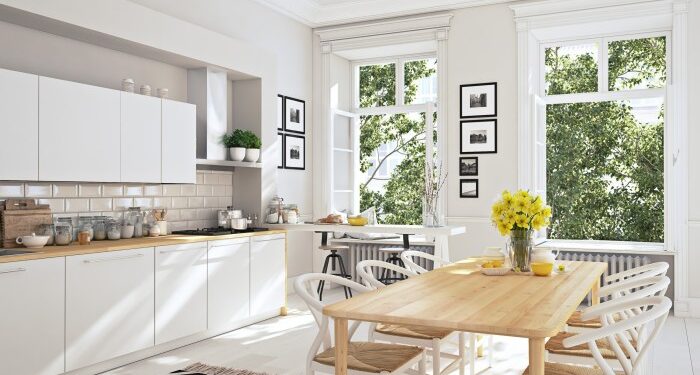Embark on a journey to transform your kitchen with our comprehensive guide to kitchen remodeling near you. From choosing the right materials to optimizing space, get ready to elevate your cooking space to a whole new level.
Discover the secrets to a successful kitchen renovation and unlock the potential of your home's heart.
Researching Local Contractors
When it comes to kitchen remodeling, finding the right contractor is crucial for a successful project. One of the first steps in this process is researching local contractors in your area.
Benefits of Hiring Local Contractors
- Local contractors have a better understanding of the local building codes and regulations, ensuring your project is compliant.
- They are more accessible for communication and site visits, making it easier to address any concerns or changes during the project.
- Supporting local businesses helps boost the local economy and fosters a sense of community.
Comparing Reviews and Ratings
- Check online platforms like Yelp, Google reviews, and Angie's List to see what previous clients have to say about the contractors.
- Look for patterns in the reviews, such as consistent complaints or praises, to get a better idea of the contractor's work quality.
- Consider the overall rating as well as the number of reviews to gauge the contractor's reputation.
Importance of Checking Licenses and Insurance
- Verify that the contractor holds the necessary licenses to operate in your state or locality, ensuring they meet the required standards.
- Ask for proof of insurance, including liability and worker's compensation, to protect yourself from any potential risks or liabilities during the project.
- Unlicensed or uninsured contractors may offer lower prices, but they pose a higher risk of subpar workmanship or legal issues.
Setting a Budget
Determining a realistic budget for kitchen remodeling is crucial to ensure that you can afford the renovation without overspending. Here are some tips on how to set a budget for your kitchen remodeling project:
Factors Affecting Cost
When setting a budget for kitchen remodeling, it's essential to consider the following factors that can affect the overall cost of the project:
- The size of your kitchen: Larger kitchens will generally cost more to renovate compared to smaller ones.
- The quality of materials: Using high-end materials will increase the cost of the renovation.
- The extent of the renovation: Complete kitchen overhauls will be more expensive than minor updates or cosmetic changes.
- Labour costs: Hiring professional contractors will add to the overall cost of the project.
- Additional features: Adding special features like custom cabinetry, high-end appliances, or smart technology will increase the cost.
Prioritizing Expenses
Once you have determined your budget and considered the factors affecting the cost, it's important to prioritize expenses within your budget for the renovation. Here are some ideas on how to allocate your budget effectively:
- Allocate the majority of your budget to essential items like cabinets, countertops, and appliances.
- Consider splurging on one or two high-end items that will make a significant impact on the overall look and functionality of your kitchen.
- Look for cost-saving opportunities by choosing mid-range materials or opting for ready-to-assemble cabinets.
- Factor in a contingency fund for unexpected costs that may arise during the renovation process.
Design Inspiration
When embarking on a kitchen remodeling project, finding the right design inspiration is key to achieving a space that reflects your style and meets your needs. By exploring popular design trends and examples of successful renovations, you can create a cohesive design concept for your new kitchen.
Popular Design Trends
- Minimalist Design: Clean lines, sleek surfaces, and a clutter-free look
- Smart Technology Integration: Appliances and fixtures with smart features for convenience
- Open Shelving: Displaying kitchen items for a modern and functional touch
- Statement Lighting: Bold light fixtures that serve as focal points in the kitchen
Creating a Cohesive Design Concept
- Choose a color scheme that complements your home's overall aesthetic
- Consider the layout and flow of the space for optimal functionality
- Incorporate elements that reflect your personal style and preferences
Before and After Renovation Projects
- Before: Outdated cabinets, limited counter space, and inadequate lighting
- After: Upgraded cabinetry, extended countertops, and enhanced lighting for a modern look
- Before: Closed-off kitchen with limited natural light
- After: Open concept layout with added windows and skylights for a bright and airy feel
Choosing Materials and Finishes
When it comes to kitchen remodeling, selecting the right materials and finishes is crucial to achieving the desired look and functionality of your space. From countertops to flooring to cabinets, each choice impacts the overall design and durability of your kitchen.
Countertops
- Granite: Known for its durability and heat resistance, but requires regular sealing to prevent stains.
- Quartz: Non-porous and low maintenance, with a wide range of colors and patterns available.
- Marble: Elegant and timeless, but can be prone to scratching and staining.
Flooring
- Hardwood: Classic and warm, but vulnerable to water damage and scratches.
- Tile: Durable and easy to clean, with endless options in terms of colors and designs.
- Laminate: Budget-friendly and versatile, but not as resistant to moisture as other options.
Cabinets
- Wood: Traditional and sturdy, with different wood species offering unique grains and finishes.
- Laminate: Affordable and easy to clean, available in various colors and styles.
- Thermofoil: Resistant to moisture and easy to maintain, but can be prone to peeling over time.
Finishes
When choosing finishes for your kitchen, consider the overall style you want to achieve. From matte to glossy finishes, each option can impact the look and feel of your space. Additionally, selecting the right hardware, such as knobs and handles, can add a final touch to your kitchen design.
Maximizing Space and Functionality
When remodeling a small kitchen, optimizing space is crucial to ensure a functional and efficient layout. By implementing smart storage solutions and focusing on ergonomic design, you can make the most out of your kitchen space.
Optimizing Space in a Small Kitchen
Small kitchens require careful planning to maximize every inch of space. Here are some tips to help you make the most of your limited kitchen area:
- Utilize vertical storage by installing tall cabinets or shelves to take advantage of the height of the room.
- Consider using multi-functional furniture pieces, such as a kitchen island with built-in storage or a pull-out pantry.
- Opt for compact appliances that are specifically designed for small spaces without compromising on functionality.
Importance of Functionality and Ergonomic Design
Functionality and ergonomic design play a significant role in a successful kitchen renovation. Here's why these factors are crucial:
- Efficient workflow: A well-designed kitchen layout enhances productivity and makes cooking tasks easier and more enjoyable.
- Comfort and safety: Ergonomically designed features reduce strain on the body and minimize the risk of accidents in the kitchen.
- Long-term usability: A functional kitchen design ensures that your space remains practical and convenient for years to come.
Smart Storage Solutions
Smart storage solutions can help you declutter your kitchen and create a more organized space. Consider the following ideas for maximizing storage in your kitchen:
- Install pull-out drawers and shelves to access items easily without having to rummage through cabinets.
- Use overhead pot racks or hooks to free up cabinet space and keep frequently used cookware within reach.
- Incorporate hidden storage compartments, such as toe-kick drawers or corner cabinets with rotating shelves, to make the most of every nook and cranny.
Project Timeline and Managing Expectations
When embarking on a kitchen remodeling project, understanding the typical timeline and effectively managing expectations are crucial for a successful renovation experience.
Typical Timeline for a Kitchen Remodeling Project
Before diving into a kitchen renovation, it's important to have a clear understanding of the typical timeline from start to finish. While every project is unique, here is a general breakdown of the stages involved:
- Planning and Design Phase: 1-3 months
- Obtaining Permits and Approvals: 1-2 months
- Demolition and Preparation: 1-2 weeks
- Installation of Cabinets, Countertops, and Fixtures: 2-4 weeks
- Finishing Touches and Final Inspections: 1-2 weeks
Effective Communication with Contractors
Communication is key when it comes to ensuring your kitchen remodeling project stays on schedule. Here are some tips for effectively communicating with contractors:
- Establish clear expectations and timelines from the beginning.
- Regularly check in with your contractor to monitor progress and address any concerns.
- Create a communication plan outlining preferred methods of contact and frequency of updates.
- Be open to feedback and willing to make adjustments as needed.
Managing Expectations and Dealing with Delays
Despite careful planning, unexpected delays can sometimes occur during a renovation. Here are some tips for managing expectations and navigating delays:
- Build some buffer time into your project timeline to account for potential setbacks.
- Stay flexible and maintain open communication with your contractor to address any issues promptly.
- Focus on the end result and keep in mind that some delays may be necessary to ensure a high-quality outcome.
Wrap-Up
As we conclude our exploration of kitchen remodeling near you, remember that a well-designed kitchen is more than just a place to cook—it's a reflection of your style and functionality. Embrace the possibilities, and let your dream kitchen become a reality.
FAQ
How can I find the best local contractor for my kitchen remodeling project?
Research online reviews, ask for recommendations from friends or family, and ensure they have the necessary licenses and insurance.
What are some popular design trends for kitchen remodeling?
Some trends include open shelving, two-toned cabinets, and quartz countertops.
How do I determine a realistic budget for my kitchen renovation?
Consider factors like the size of your kitchen, materials you want to use, and any additional features you desire.
What are some smart storage solutions for maximizing space in a small kitchen?
Utilize vertical space with shelves or hooks, invest in multi-functional furniture, and declutter regularly.
How long does a typical kitchen remodeling project take?
The timeline can vary depending on the scope of work, but on average, it can take anywhere from a few weeks to a few months.
















